Imagine a world where no email slips through the cracks, response times are lightning-fast, and your team collaborates seamlessly to resolve issues.
The right email ticketing system can make this a reality.
By converting emails into manageable tickets, these systems empower your team to prioritize and resolve issues efficiently. In this blog, I’ll share my findings with you, walking you through a list of the 11 best email ticketing software to streamline customer support.
So, let’s dive right in!
What Is an Email Ticketing System?
An email ticketing system is designed to manage customer service inquiries made through email. It converts incoming customer emails into tickets, which are tracked and managed to ensure timely and organized responses.
This structure helps customer support teams maintain accountability and efficiency, as they can prioritize, assign, and resolve issues systematically.
Email ticketing systems ensure that customer interactions are handled professionally and efficiently, reinforcing the importance of quality customer service in sustaining business success.
Here’s an overview of the top email ticketing tools.
| Email Ticketing System | Best For | Pricing |
|---|---|---|
| ProProfs Help Desk | AI Help Desk & Email Ticketing for Customer Delight | Forever FREE for small teams. Paid plan starts at $19.99/month. |
| Freshdesk | Multichannel Communications | Starts at $15/month. |
| SysAid | AI-powered ITSM | Starts at $15/month. |
| LiveAgent | Chat-Based Support | Starts at $9/month. |
| Zoho Desk | Zoho Suite Users | Starts at $14/month. |
| Intercom | Streamlining Support Workflows | Starts at $39/month |
| Zendesk | Customer Self-Service | Starts at $55/month. |
| Hiver | Gmail-Based Help Desk Solution | Starts at $19/month. |
| SpiceWorks Help Desk | Open-Source Ticketing System for Small IT Teams | Free with limited features. |
| HelpCrunch | Personalized Help Automation | Starts at $15/month. |
| HappyFox | Custom Email Templates | Starts at $9/month. |
Spotlight on the Top 3 Email Ticketing Software : A Quick Overview
On a tight schedule? Don’t miss my top 3 favorites!
Option 1: ProProfs Help Desk
ProProfs Help Desk is a robust tool designed to improve customer satisfaction through its effective email ticketing system. It includes features like shared inboxes, automated ticket assignment, AI-powered customer intent analysis, and canned responses that streamline support processes.
Option 2: Live Agent
LiveAgent stands out for its integrated approach to customer support, combining email, chat, and social media into one seamless service. Its real-time chat widget and robust email support ensure fast and effective communication, which is crucial for maintaining high customer satisfaction.
Option 3: Hiver
Hiver is another smart solution that fosters team collaboration by integrating directly with Gmail, transforming it into an efficient help desk solution. Its familiar interface simplifies adoption and requires minimal training.
11 Best Email Ticketing System Software for 2024?
Here’s a detailed review of the 11 best email ticketing system software I’ve personally tried, highlighting their features, pros, and cons.
1. ProProfs Help Desk – Best for AI Help Desk & Email Ticketing for Customer Delight
ProProfs Help Desk creates customer delight with its comprehensive help desk and email ticketing capabilities. From my use, it’s clear that this tool is designed to boost customer satisfaction thoroughly.
With its robust email ticket system, my support team can efficiently manage, organize, prioritize, escalate, and respond to customer emails. What impresses me most is ProProfs Help Desk’s AI capabilities. For instance, AI automatically summarizes a long customer email and offers response suggestions that I can use to share faster responses.
Besides, with the shared inbox feature, we can manage multiple team inboxes like support@, returns@, inquiries@, etc., in one place. Also, custom ticket statuses make organizing emails a breeze.
What You Will Like:
- Shared inbox to manage multiple team inboxes in one place
- Internal notes can be added to tickets for internal discussions
- Automated ticket routing to efficiently direct queries to the appropriate team members
- ProProfs Live Chat, Knowledge Base & CSAT for a complete solution
What You May Not Like:
- No downloadable or on-premise version
- Dark user interface option is not available
Pricing:
Forever FREE for small teams. Paid plan starts at $19.99/month.
2. Freshdesk– Best for Multichannel Communications
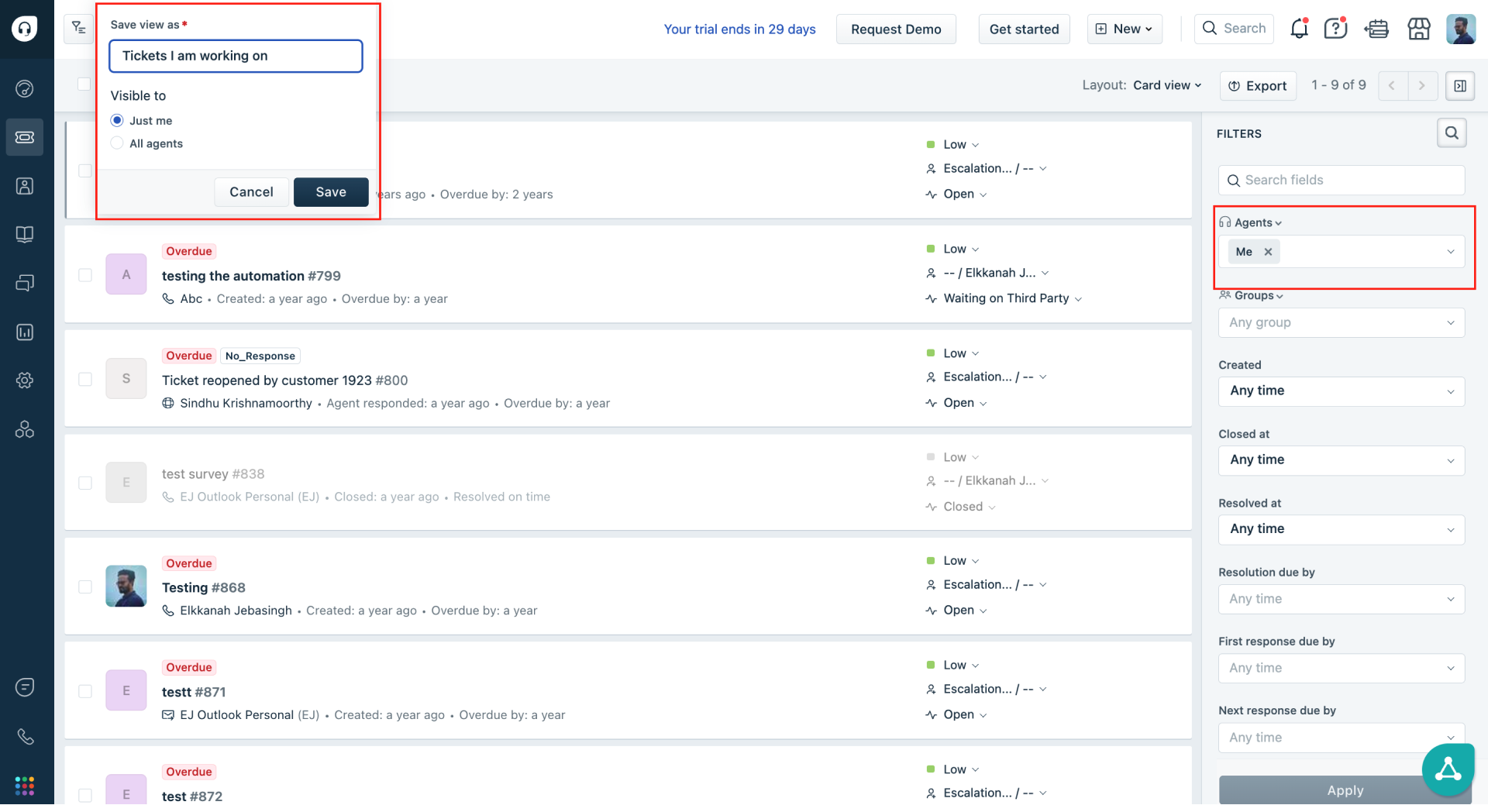
Image Source: Freshdesk
Freshdesk is ideal for handling multichannel communications, and its email ticketing system is exceptionally strong. It integrates seamlessly with various channels, including social media, phone, and chat, ensuring no customer query goes unnoticed.
What I find most beneficial is the unified ticketing dashboard that centralizes all communications, allowing for efficient management and prompt response to customer inquiries from a single interface.
This capability simplifies the support process and enhances the customer experience by providing timely and context-aware responses, ultimately fostering customer loyalty and satisfaction.
What You Will Like:
- AI-powered ticket routing to enhance efficiency
- Customizable workflows to tailor the support process to match specific needs
- Integration with popular third-party apps, such as Mailchimp and Salesforce
- Self-service portals to reduce the workload on support teams
What You May Not Like:
- The mobile app occasionally lags, which can be frustrating for support agents who need to work quickly
- Lower-tier plans have limited customization options
Pricing:
Starts at $15/user/month.
3. SysAid – Best for AI-powered ITSM
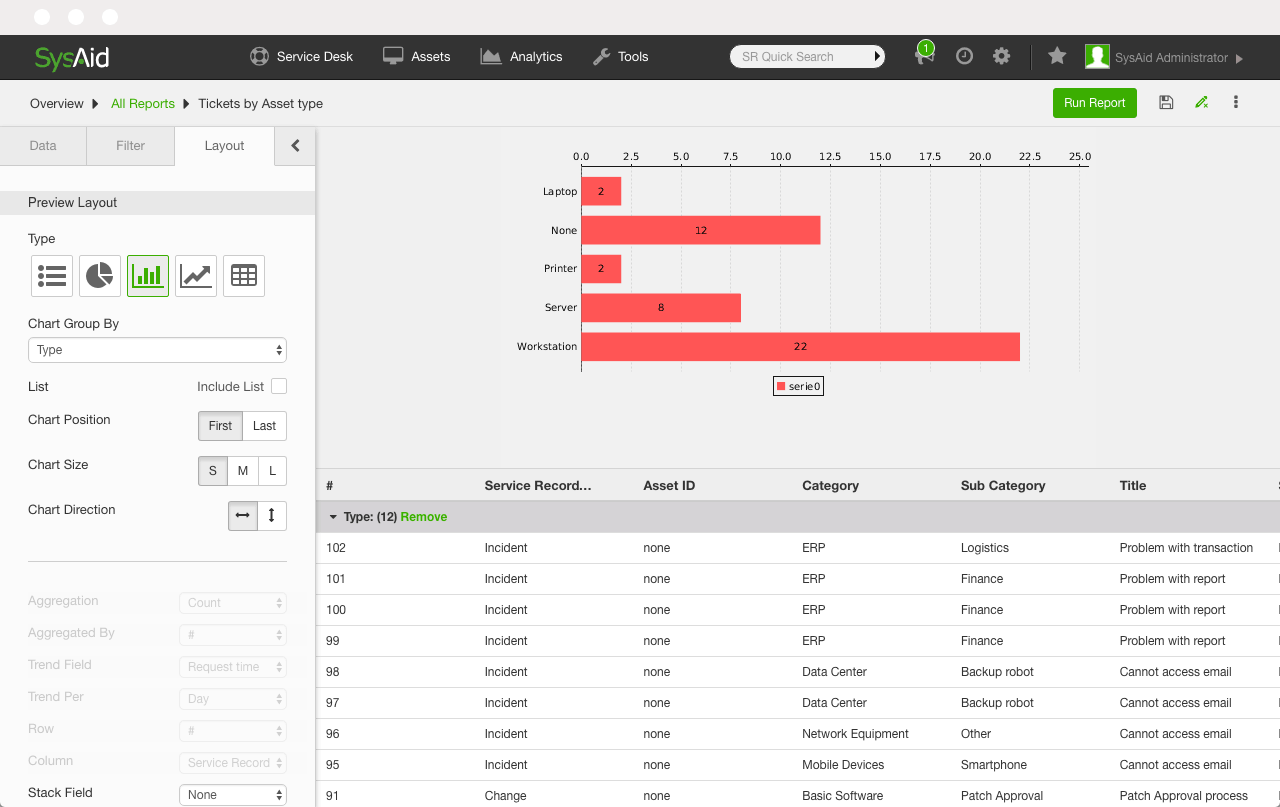
Image Source: The CTO Club
SysAid utilizes AI to improve IT Service Management (ITSM) by integrating an intelligent email ticketing system that automates workflows and provides solutions tailored from historical data. This AI integration accelerates resolution times and helps anticipate issues.
Throughout my usage, I liked SysAid’s predictive insights and automated task management, which have significantly streamlined IT operations, making them more efficient and less prone to human error.
The tool is particularly suited for IT departments looking to reduce workload and increase operational efficiency through innovative AI technologies.
What You Will Like:
- Advanced asset management for efficient resource utilization
- Customizable workflows and forms to meet specific support needs
- Proactive incident alerts to prevent potential disruptions in IT operations
- Robust security features to protect sensitive data
What You May Not Like:
- The setup process can be complex
- The interface has limited customization options
Pricing:
Starts at $15/user/month.
4. LiveAgent– Best for Chat-Based Support
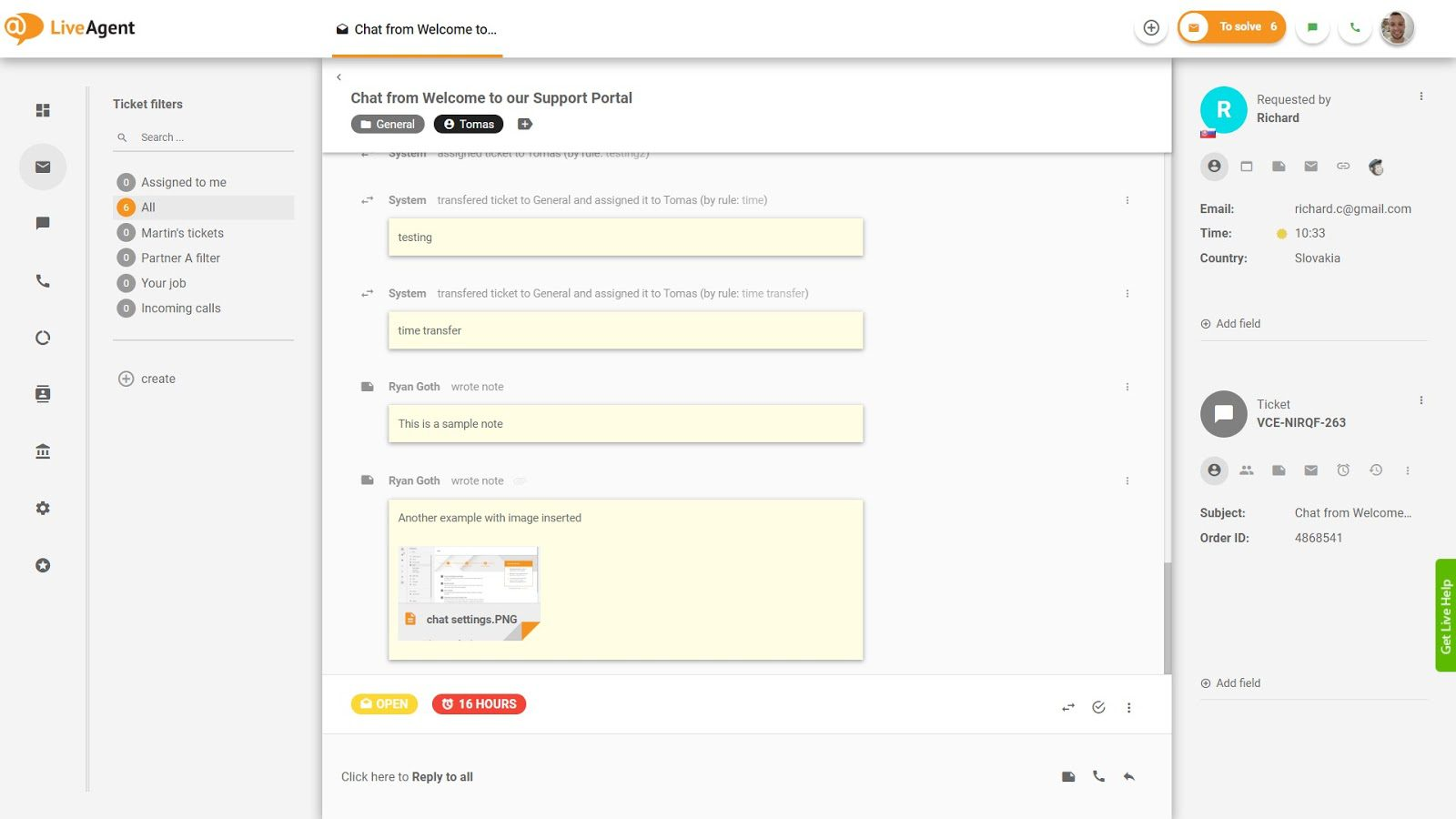
Image Source: LiveAgent
LiveAgent excels in chat-based support, but its email ticketing features are equally commendable. The platform integrates email, chat, and social media into a cohesive service experience, which boosts the responsiveness and efficiency of support teams.
The real-time chat widget, combined with robust email support, offers a comprehensive approach to customer service, ensuring immediate attention and thorough follow-up communications, which are critical in maintaining high customer satisfaction levels.
While LiveAgent is great for teams that rely on fast and effective communication to enhance customer service, its pricing can be expensive for small businesses or those with limited budgets, especially as the number of agents increases.
What You Will Like:
- Built-in call center to centralize communication needs on the platform
- Video chat capabilities for enhanced real-time communication and support
- Extensive customization options for chat widgets to align with brand aesthetics
- Comprehensive reporting tools to analyze chat efficiency and agent performance
What You May Not Like:
- There are occasional delays in ticket updates, which can affect response times
- The automation features are basic compared to those offered by some competitors
Pricing:
Starts at $9/user/month.
5. Zoho Desk– Best for Zoho Suite Users
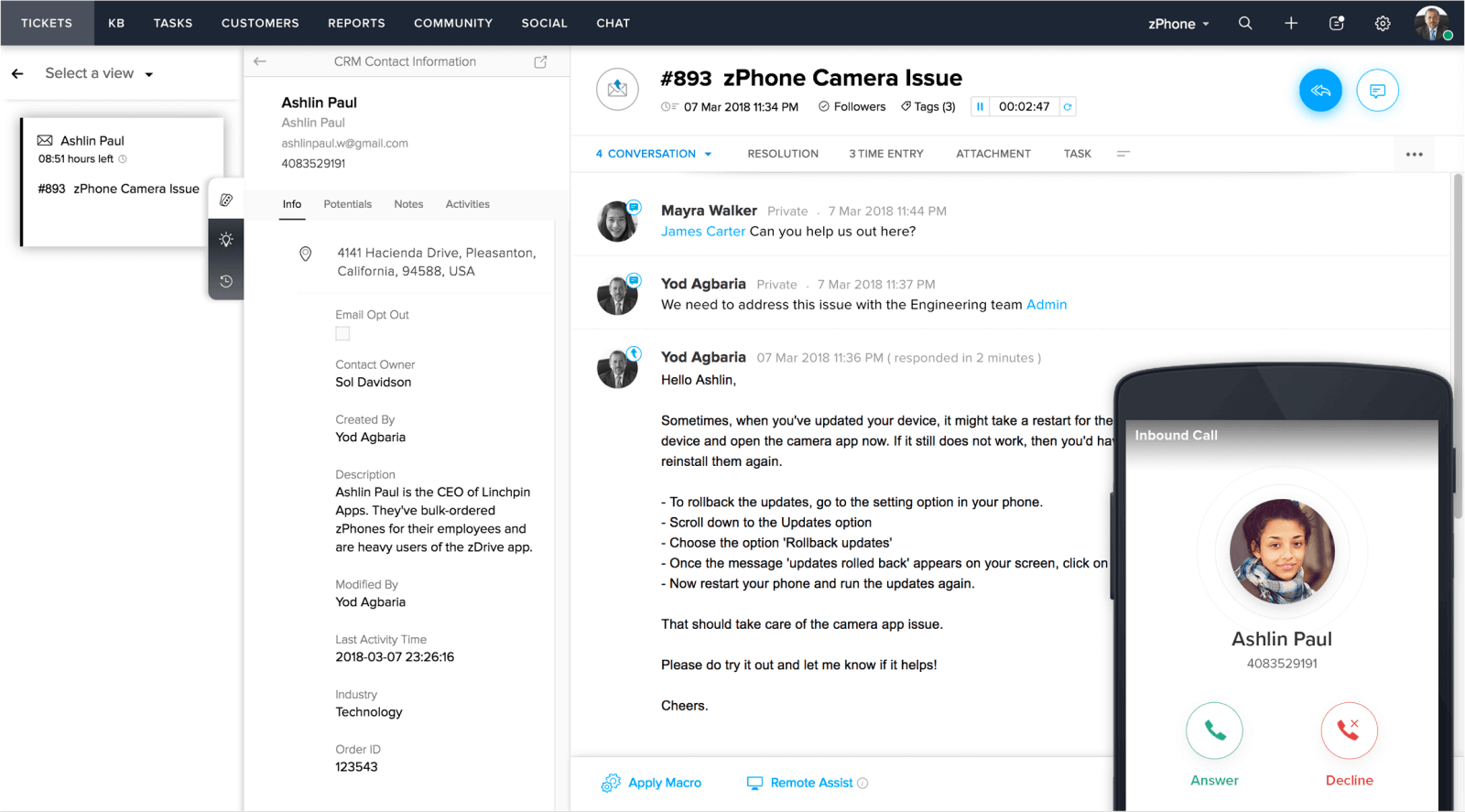
Image Source: Zoho
Zoho Desk offers a clean and user-friendly interface that makes it easy to manage incoming emails, convert them into tickets, and track their progress. Zoho Desk also includes helpful automation features like email routing and predefined responses to streamline your workflow and improve response times.
If your business relies on Zoho CRM or other Zoho services, Zoho Desk becomes even more appealing. This seamless integration allows for a unified view of customer interactions and data, leading to better customer support and informed decision-making.
The reporting and analytics capabilities of Zoho Desk truly amaze me. You can gain valuable insights into your customer support performance, identify trends, and make data-driven decisions to improve your service.
What You Will Like:
- AI-powered Zia bot for quick replies and routing tickets efficiently
- Advanced ticketing system email to prioritize queries based on urgency and relevance
- Integration with other Zoho products and various third-party applications
- Multi-channel communication to let customers reach out via their preferred methods
What You May Not Like:
- The platform has a steeper learning curve for new users, which can result in a longer onboarding process
- Lower-tier plans offer limited customization options, which may not meet the needs of all businesses
Pricing:
Starts at $14/user/month.
6. Intercom – Best for Streamlining Support Workflows
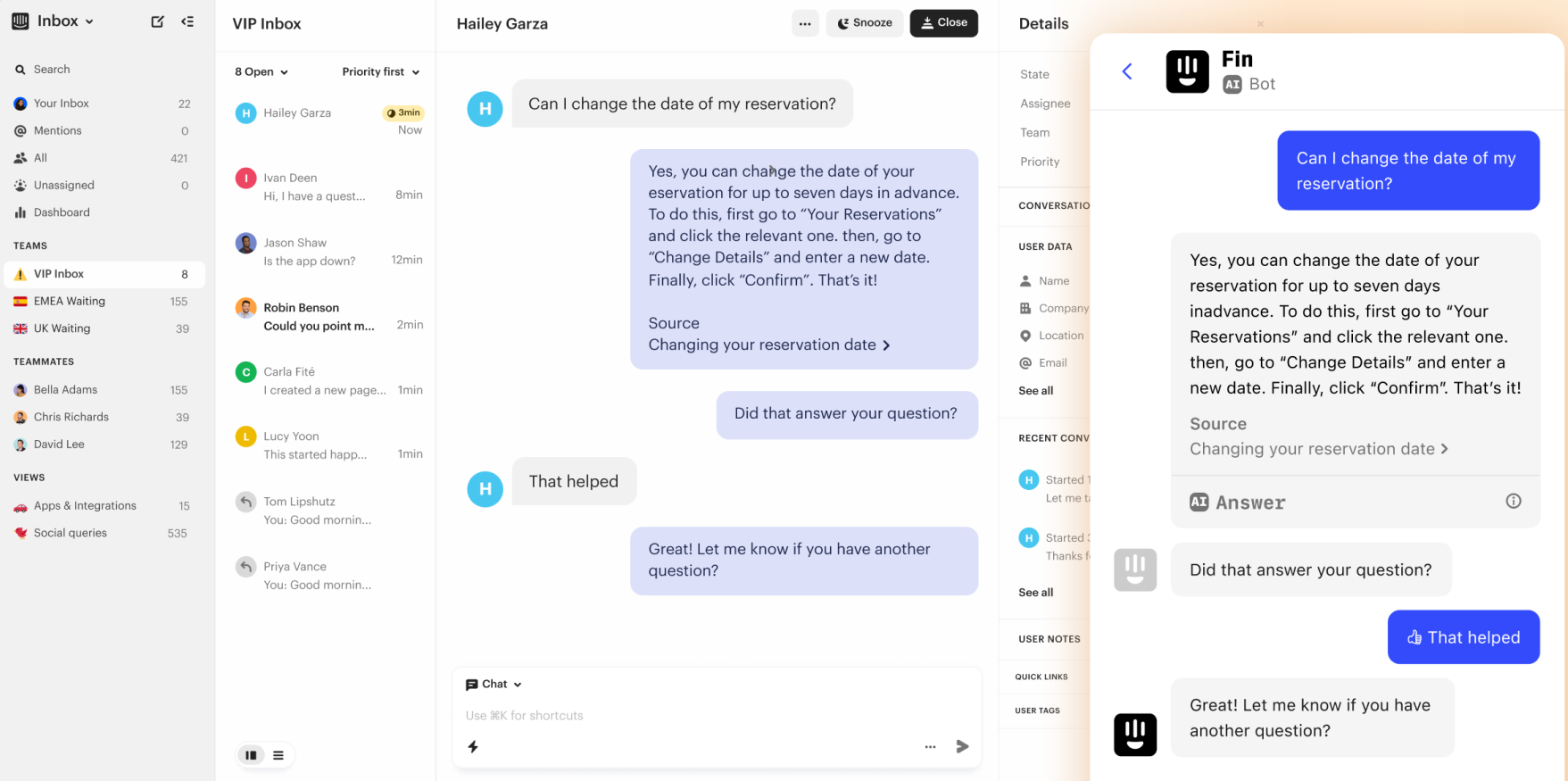
Image Source: Intercom
I see Intercom as a really modern and powerful email ticketing system. It’s designed to make customer communication smooth and efficient. I love how it integrates with other channels like live chat and in-app messaging, giving me a complete view of each customer’s journey.
Intercom’s strength lies in streamlining support workflows. It allows you to automate repetitive tasks, route tickets to the right teams, and prioritize urgent issues. This ensures that no email falls through the cracks and that customers receive timely assistance. With features like canned responses and macros, you can resolve common queries quickly and efficiently.
However, one thing to keep in mind is that Intercom’s pricing can be quite steep, especially as your team and usage grow. This might make it less appealing for smaller businesses or those with limited budgets.
What You Will Like:
- Powerful automation features to automate routine tasks and suggest responses
- Customizable chatbots to improve response times and customer satisfaction
- Detailed customer profiles to enable personalized and effective agent assistance
- Features like internal notes and @mentions to improve team collaboration
What You May Not Like:
- The setup process can be complex, requiring significant time and resources to implement the system effectively
- The interface has limited customization options, which may not meet the needs of all users
Pricing:
Starts at $39/user/month.
7. Zendesk– Best for Customer Self-Service
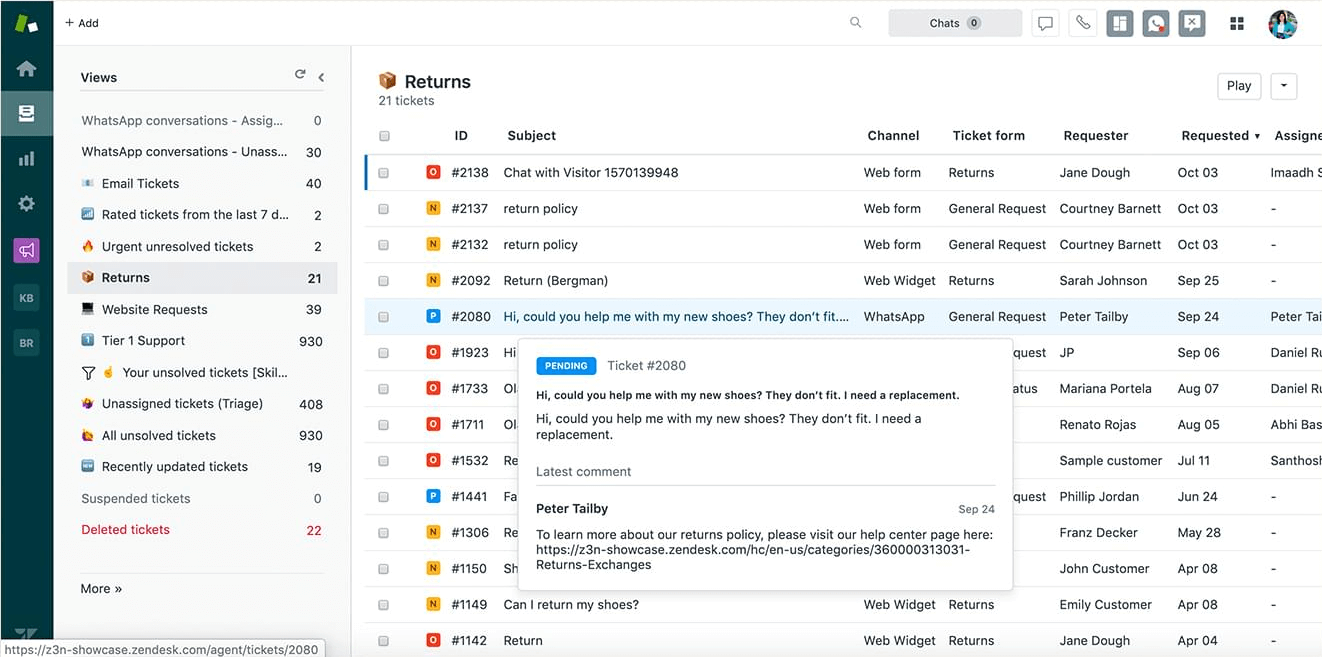
Image Source: Zendesk
Zendesk played a vital role in our strategy to empower customers through self-service options. It has a really robust help center platform that allowed me to create a knowledge base and FAQs, empowering customers to find answers on their own.
It easily adapted to the needs of my growing business, and it integrated seamlessly with many other tools I used. This made it a central hub for all my customer support interactions. Plus, the interface was clean and user-friendly, making it easy for my team to learn and use effectively.
Plus, it was great at organizing customer support emails, and I really liked the way it allowed me to set up automated workflows to handle common requests. This freed up my team to focus on more complex issues.
What You Will Like:
- Smooth integration for cohesive customer experience across communication channels
- AI-powered bots to assist routine inquiries, enhancing operational efficiency
- Robust customization to create a fully branded help center experience
- Global customer service operations to support multiple languages and regions
What You May Not Like:
- Accessing full functionality requires subscribing to higher pricing tiers, which may be costly
- Some integrations may require technical expertise to set up properly
Pricing:
Starts at $55/user/month.
8. Hiver– Best for Gmail-Based Help Desk Solution
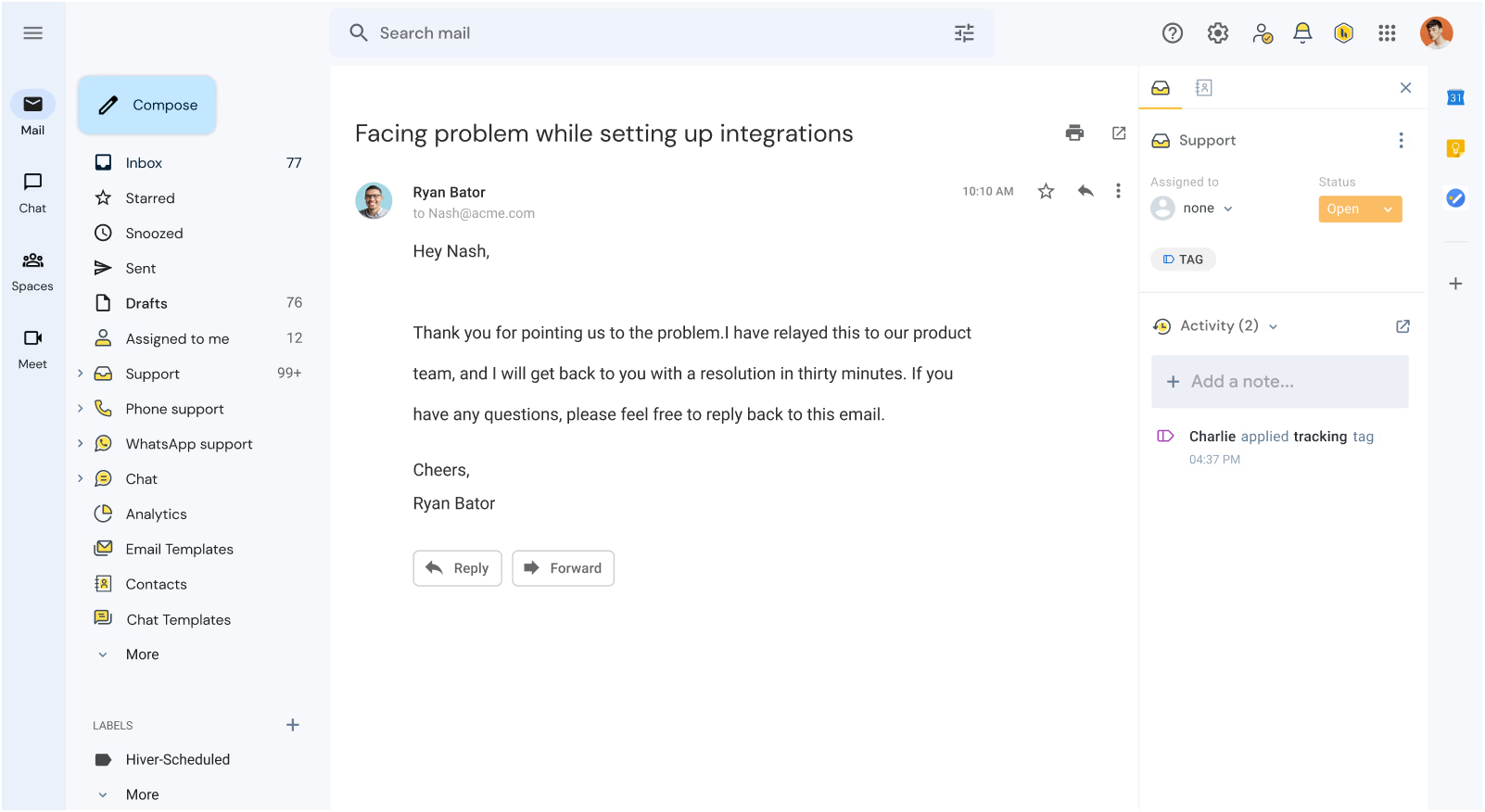
Image Source: Hiver
Hiver has been transformative for our team, integrating seamlessly with Gmail to create a powerful help desk solution right within our email platform. This integration has streamlined our communication and significantly improved our response times.
The tool transforms the familiar Gmail interface into a powerful help desk solution, making it incredibly easy for teams to adopt and use without extensive training. Its user-friendly design encourages immediate engagement, allowing teams to quickly leverage its capabilities.
Its email ticketing system operates directly from Gmail, providing essential features like shared inboxes and email tags, which enhances collaboration and response processes. This seamless integration with Gmail ensures a smooth user experience and efficient management of customer inquiries.
What You Will Like:
- Shared inboxes to streamline collaboration
- Real-time alerts to keep teams updated on tickets and replies
- Collision detection to prevent duplicate replies and internal confusion
- Mobile app to manage emails and collaborate on the go
What You May Not Like:
- Hiver’s functionality is limited to those who use Gmail, making it less versatile for users of other email services
- Compared to specialized ticketing systems, Hiver’s features might seem basic or limited
Pricing:
Starts at $19/user/month.
9. Spiceworks Help Desk – Best for Open-Source Ticketing System for Small IT Teams
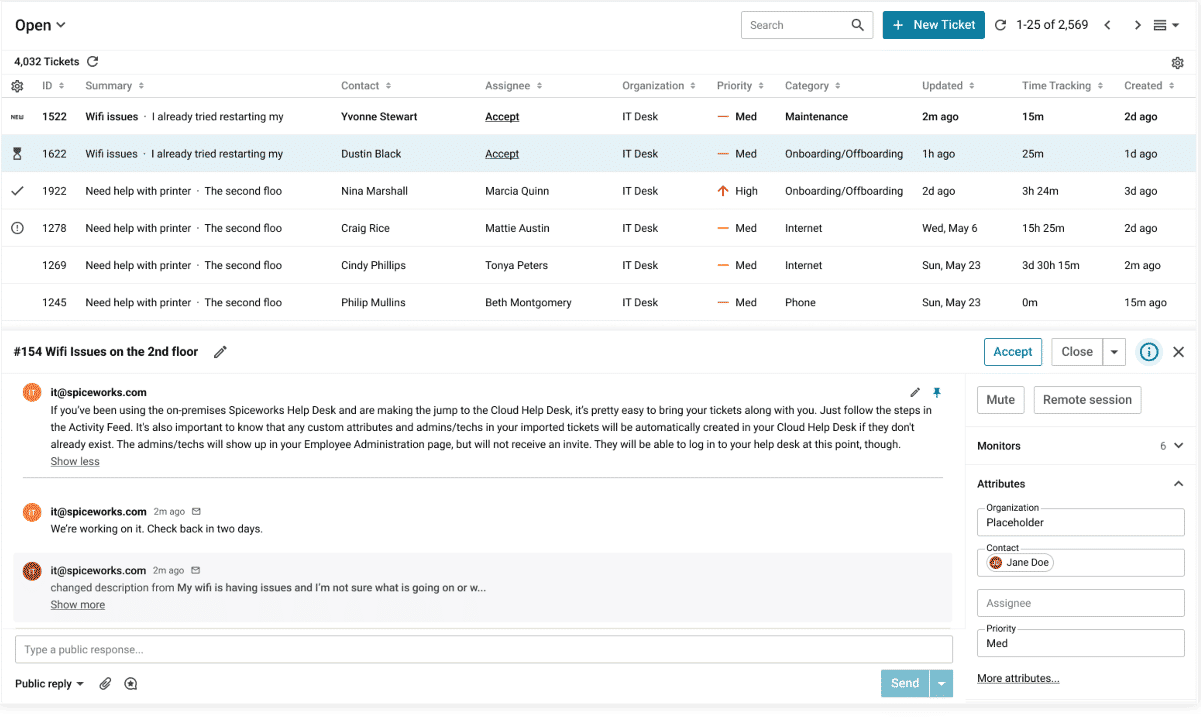
Image Source: Spiceworks
SpiceWorks Help Desk is an excellent choice for small IT teams, offering an open-source ticketing system that provides essential functionalities without the complexities or costs associated with commercial products.
My experience with its email ticketing system has been positive, featuring straightforward yet effective tools for ticket management, reporting, and team collaboration, all of which are crucial for delivering efficient IT support.
The simplicity and effectiveness of SpiceWorks Help Desk make it an excellent choice for small, resource-conscious IT teams that need a straightforward yet capable ticketing solution.
What You Will Like:
- Open-source platform allowing deep customization to fit your needs
- Integration with SpiceWorks’ community to access extensive knowledge and support
- Automated ticket tracking to prevent missed information
- Cloud-based access to use the system from anywhere
What You May Not Like:
- Limited scalability makes it unsuitable for larger organizations with more complex needs
- Support is mainly community-driven, which can vary in responsiveness and expertise
Pricing:
Free with limited features.
10. HelpCrunch– Best for Personalized Help Automation
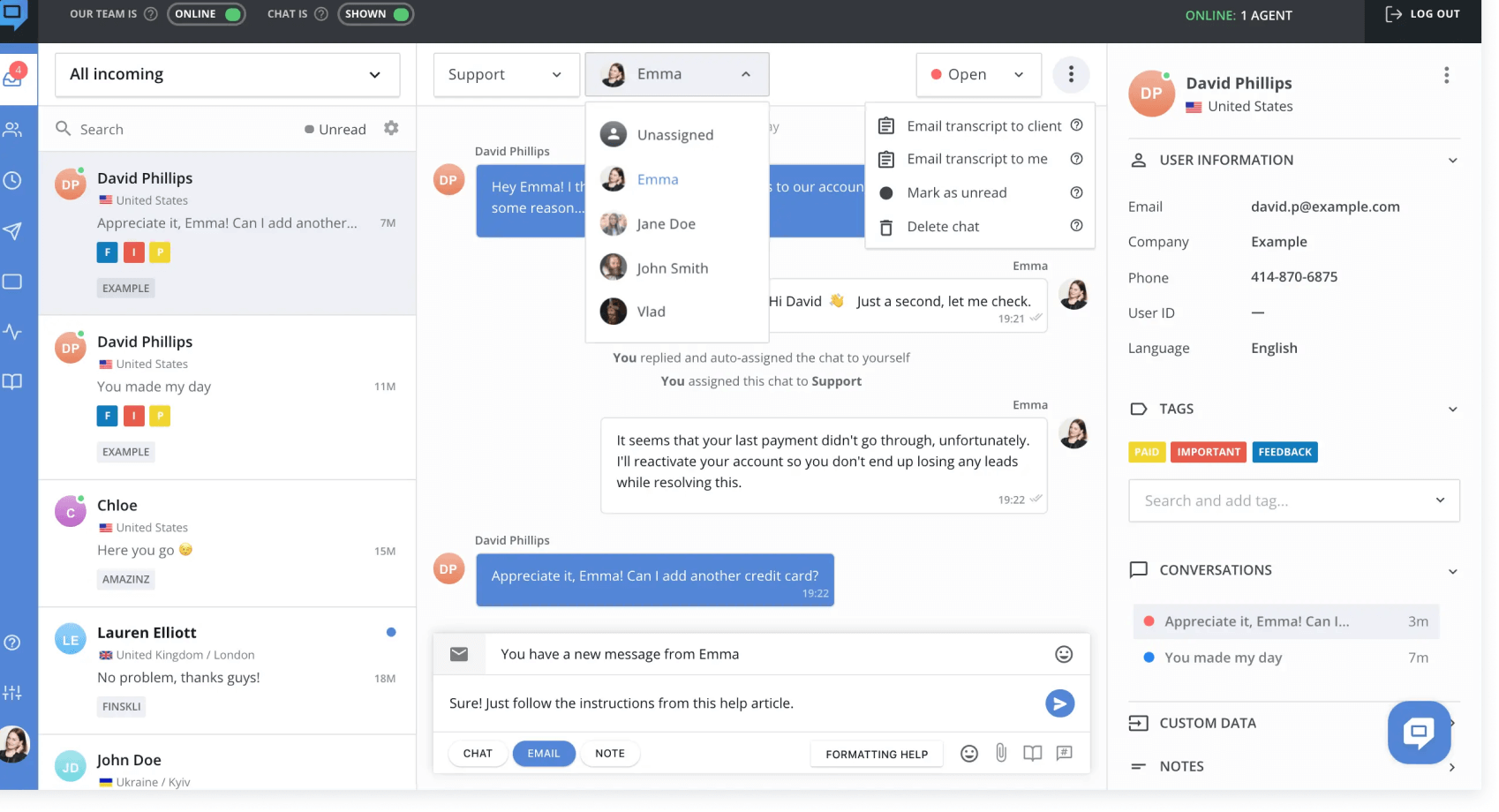
Image Source: Helpcrunch
HelpCrunch has played a crucial role in automating and personalizing our help desk interactions. This platform allows for the creation of customized messages and automated responses that are specifically tailored to meet individual customer preferences.
The tool excels in personalized help automation, and its email ticketing system enhances this by automating common responses and personalizing customer journeys based on behavioral and historical data.
This capability allows for tailored communications and automated responses that are specific to individual customer interactions, which I’ve found to be a game-changer in improving the customer experience through thoughtful, automated touchpoints.
What You Will Like:
- Extensive messaging and email customization to offer a personalized touch
- Integrated knowledge base to empower customers to self-help effectively
- Advanced automation features to streamline interactions for efficient support operations
- Mobile SDK for easy support integration in apps
What You May Not Like:
- Limited third-party integrations may restrict the platform’s ability to work seamlessly with other tools used by the business
- Customizing emails and messages can be complex and may require more time to master
Pricing:
Starts at $15/user/month.
11. HappyFox – Best for Custom Email Templates
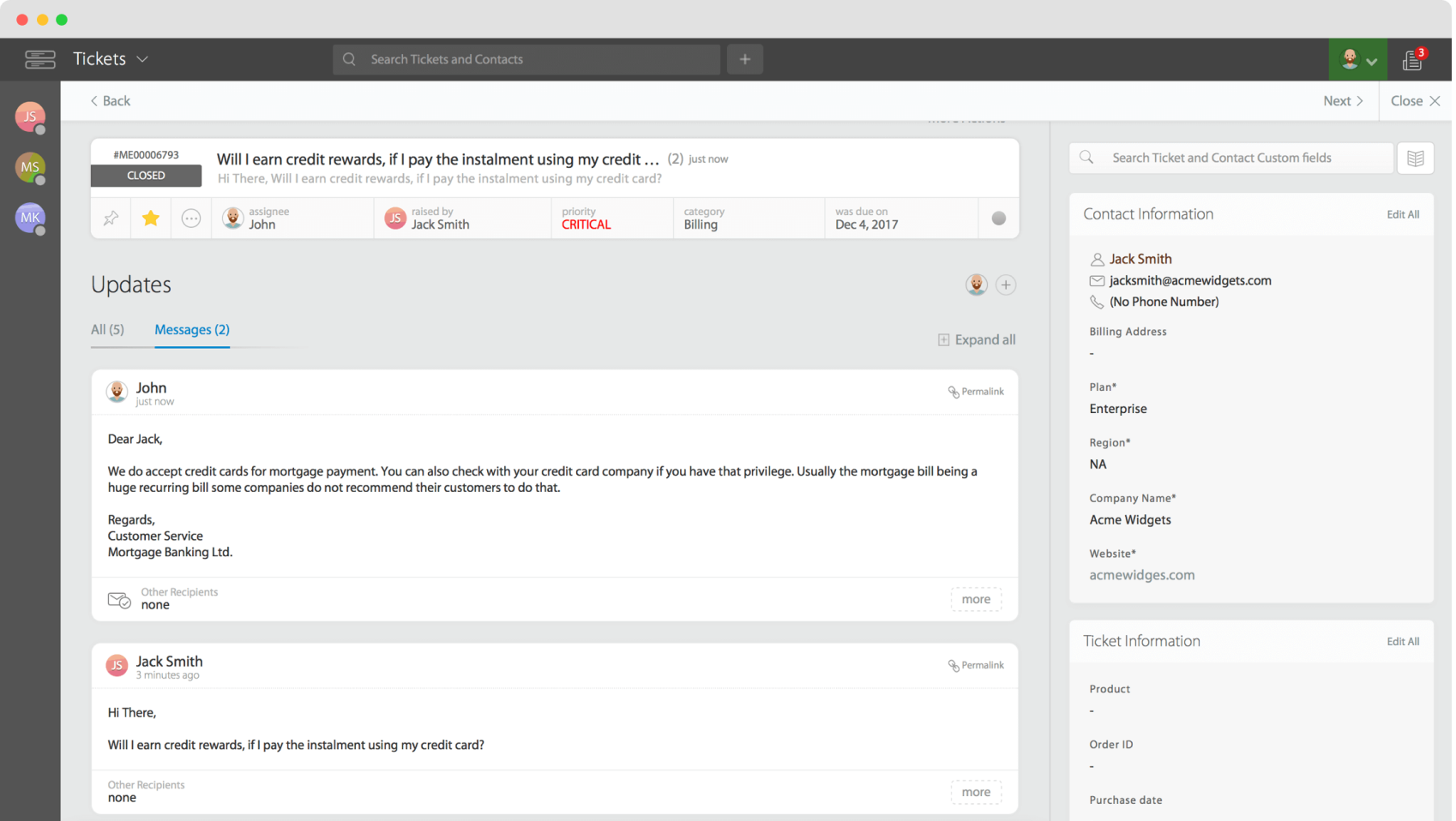 Image Source: HappyFox
Image Source: HappyFox
From my experience, HappyFox is a reliable choice for an email ticketing system if you’re looking for a good balance of power and flexibility. I like how it takes all support emails and turns them into organized tickets, which makes it much easier to manage customer inquiries.
One of the best features is the ability to create custom email templates for frequently asked questions. This has drastically reduced our response time and freed up our agents to focus on more complex issues
While HappyFox offers a good range of reporting options, I sometimes find it a bit clunky to navigate and generate the exact reports I need. A more intuitive and user-friendly reporting dashboard would be a welcome improvement.
What You Will Like:
- Omnichannel support to provide consistent support across all channels
- Mobile apps to access and manage tickets on the go
- Automation engine to automate repetitive tasks such as ticket routing, assignment
- Extensive customization options to tailor the system to your specific needs
What You May Not Like:
- Some users find the interface less intuitive
- HappyFox’s mobile apps have limited functionality
Pricing:
Starts at $9/user/month.
How Does an Email Ticketing System Work?
An email ticketing system streamlines customer support by converting email inquiries into organized support tickets. Here’s how it generally works:
1. Email Inquiries
Customers initiate support requests by sending emails to a designated support email address. This email address is often publicized on the company’s website, in product documentation, or through customer service channels. Each email serves as a communication entry point for customers seeking assistance or information about products or services.
2. Ticket Creation
The email ticketing system automatically captures incoming emails and generates support tickets within the platform. Each ticket typically includes essential details, such as the sender’s email address, the subject line, and the email body. The system may also assign a unique ticket number for easy tracking and reference. This automation reduces manual data entry and ensures that no customer inquiries are missed.
3. Ticket Management
Once created, support agents can view and manage these tickets within the ticketing system. They have the ability to prioritize tickets based on urgency or the complexity of the issue, categorize them by topic or department, and assign them to specific team members. This organized approach helps teams address customer needs more effectively and improves overall workflow efficiency.
4. Response Tracking
Support agents respond to customer inquiries directly through the ticketing system. When an agent replies to a ticket, the system typically sends the response back to the customer as an email. This ensures that all communication is linked to the original ticket, providing a complete history of interactions. Customers can refer back to previous emails, making it easier to follow up or clarify issues.
5. Status Updates
The system continuously tracks the status of each ticket, updating it as it progresses through various stages (e.g., open, pending, resolved). This transparency allows both agents and customers to monitor the ticket’s progress. Customers often receive notifications regarding status changes, which keeps them informed and reassured that their inquiry is being addressed.
6. Reporting and Analytics
Most email ticketing systems provide robust reporting and analytics features that allow companies to analyze key metrics. These may include response times, ticket volume, resolution rates, and customer satisfaction scores. By reviewing these metrics, businesses can identify trends, measure performance, and uncover areas for improvement.
Overall, an email ticketing system helps ensure that no customer inquiries are overlooked, facilitates better communication, and enhances the efficiency of the support team.
What Should You Look for in an Email Support System?
When choosing an email support system, it’s essential to consider a variety of factors to ensure you select a solution that meets your specific needs. Here are some key aspects to keep in mind:
1. User-Friendly Interface
A user-friendly interface is crucial for efficient email management. Look for a system that features an intuitive layout, allowing your team to navigate easily. A clean design can enhance productivity and reduce the learning curve for new team members, enabling them to respond to customer inquiries quickly.
2. Integration Capabilities
The ability to integrate seamlessly with your existing tools is vital. Whether it’s your CRM software, chatbots, or other customer support platforms, strong integration capabilities can streamline your workflow and enhance overall efficiency. This interconnectedness ensures that all customer interactions are unified, providing a more holistic view of customer engagement.
3. Automation Features
Automation can significantly improve your team’s efficiency. Look for features such as automated responses to common inquiries, intelligent ticket assignment based on agent availability or expertise, and follow-up reminders to ensure timely responses. These tools can save time and reduce the risk of human error, ensuring that no customer inquiry falls through the cracks.
4. Customizable Templates
Having the ability to create and customize email templates is a great advantage. This feature allows your team to maintain brand consistency across all communications while speeding up response times. Well-designed templates can also ensure that essential information is included in every reply, providing customers with a consistent experience.
5. Collaboration Tools
Effective collaboration within your support team can make a significant difference in the quality of service you provide. Look for features that allow team members to collaborate on support tickets, share notes, and assign tasks to one another. This can foster better communication within your team and improve the overall efficiency of handling customer inquiries.
6. Reporting and Analytics
A good email support system should offer robust reporting and analytics capabilities. Having insights into key performance metrics, such as average response times, ticket resolution rates, and customer satisfaction scores, helps you evaluate and improve your support strategy. This data-driven approach can assist in identifying trends and areas for improvement, ultimately leading to a better customer experience.
7. Scalability
As your business grows, your email support needs will likely evolve as well. Choose a system that can scale with your business, accommodating increasing volumes of emails while providing additional features as needed. This adaptability ensures that your support operations can continue to meet customer demands without significant disruptions.
8. Security and Compliance
With increasing concerns about data privacy and security, it’s essential to choose an email support system that adheres to stringent security standards and compliance regulations. This is especially important if your organization handles sensitive customer data. Look for features such as data encryption, user authentication, and regular security updates to safeguard your communications.
9. Multi-Channel Support
Today, customers engage through various channels. Consider selecting a system that allows you to manage emails alongside other communication channels (like chat, social media, and phone support) all in one platform. This multi-channel support ensures a more cohesive customer experience, allowing you to track and respond to inquiries regardless of the medium.
10. Customer Support
Lastly, don’t overlook the importance of customer support for the email system itself. Check the support options available, such as live chat, email support, or phone assistance. Reliable customer support can be crucial if you encounter any issues or have questions about using the system, ensuring minimal downtime for your operations.
By considering these factors, you can select an email support system that enhances your team’s efficiency, improves customer satisfaction, and supports your business goals.
What Are the Benefits of Using an Email Ticketing System?
Using an email ticket system offers several benefits that can streamline your customer support and improve efficiency:
1. Centralized Communication
An email ticketing system consolidates all customer queries and support requests into a single platform, allowing your team to manage multiple requests efficiently. Instead of sorting through scattered emails, every issue is tracked and logged under a unique ticket number, making it easier to search, monitor, and prioritize. This centralization ensures that no customer request falls through the cracks, leading to improved response rates and organized workflows.
2. Improved Collaboration
Support teams can seamlessly collaborate on tickets by assigning tasks to the most suitable team member or escalating issues when needed. If a problem requires input from different departments, team members can easily add internal notes or share the ticket for cross-functional collaboration. This reduces delays and ensures that customers get accurate, comprehensive solutions, which in turn boosts team productivity and overall customer satisfaction.
3. Automated Workflows
Email ticketing systems often come with automation features that can handle repetitive tasks. Tickets can be automatically assigned to the right department, reminders can be set for pending responses, and status updates can be triggered based on ticket activity. Automation not only saves time but also reduces human errors, ensuring faster resolutions and enhancing the overall efficiency of your support process.
4. Better Customer Experience
By providing customers with prompt and consistent communication, an email ticketing system improves the overall customer experience. Customers can easily submit their queries and track their ticket’s progress. Timely updates on the status of their issue help to build trust, reduce frustration, and enhance customer loyalty. The transparency and reliability offered by an email ticketing system lead to higher customer retention and better relationships.
5. Detailed Analytics
Most email ticketing systems provide robust reporting and analytics capabilities, offering insights into key performance metrics such as ticket volume, average response time, and resolution rates. These reports help identify bottlenecks, measure team performance, and highlight areas for improvement. By analyzing these metrics, support teams can make data-driven decisions, allocate resources more effectively, and continuously optimize their service.
By integrating these features, email ticketing systems help streamline support operations, improve response times, and elevate the overall customer experience.
How Can Different Teams Use an Email Ticketing System?
Different teams across an organization can utilize an email based ticketing system in various ways to improve communication, streamline workflows, and enhance overall productivity. Here’s how different teams can leverage this system:
1. Customer Support Teams
The primary users of an email ticketing system, customer support teams can manage and respond to customer inquiries efficiently. They can categorize and prioritize tickets, assign them to specific agents, and track responses in real time. The system allows for automation of routine tasks, such as acknowledging receipt of the customer’s message or sending follow-up reminders, which ensures that no query goes unanswered.
2. Sales Teams
Sales teams can use the email ticketing system to manage leads and inquiries from potential clients. Each new inquiry can be tracked as a ticket, ensuring timely follow-up. The system helps salespeople organize communication, categorize prospects, and collaborate with the marketing team on nurturing leads. Additionally, it allows for better tracking of the sales pipeline, ensuring no opportunity is missed due to overlooked emails.
3. IT Support Teams
For internal IT support, the email ticketing system helps manage technical issues and requests from employees. IT staff can categorize requests (e.g., software issues, hardware problems), prioritize based on urgency, and assign them to the appropriate team member. The system also tracks the resolution process, making it easier to monitor recurring issues and identify areas for improvement. Automation features help streamline processes like ticket routing, reducing response times and ensuring faster resolutions.
4. HR Teams
Human Resources departments can use an email ticketing system to manage employee inquiries regarding benefits, policies, and other HR-related issues. Each request is logged as a ticket, allowing HR to track and prioritize employee concerns. For example, new employee onboarding tasks can be assigned through tickets, ensuring that no step is missed. The system also provides a way to ensure confidential information is managed securely while maintaining transparency in the resolution process.
5. Finance Teams
Finance teams can utilize the email ticketing system to handle financial inquiries, such as invoice disputes, payment status updates, or budgeting requests. Each inquiry can be logged and assigned to the relevant personnel, ensuring that every request is resolved in a timely manner. Finance teams can also collaborate with other departments (like procurement or sales) to address complex issues requiring cross-functional coordination.
6. Legal and Compliance Teams
Legal and compliance teams can manage internal or external requests for document reviews, contract approvals, and compliance-related inquiries using the system. Each request can be tracked through its life cycle, ensuring no deadline is missed. The system can help ensure legal issues are properly documented, making it easier to track progress, stay compliant, and reduce the risk of legal oversights.
7. Marketing Teams
Marketing teams can use the system to handle inquiries from potential partners, media requests, or customer feedback. They can track each inquiry, assign tickets to team members, and ensure timely follow-up. Additionally, the system helps manage collaboration on marketing campaigns or events by creating tickets for different tasks and tracking their progress, which improves team efficiency.
By tailoring the system’s features to the specific needs of each department, an email ticketing system can help streamline operations, ensure accountability, and improve communication across the organization.
Boost Customer Delight With the Best Email Ticketing Solution!
Having an effective email ticketing system is essential for delivering exceptional support. With the right tool, businesses can streamline their communication, improve response times, and enhance overall customer satisfaction.
Among the best email ticketing systems discussed above, I’ve found ProProfs Help Desk to be instrumental in delivering customer delight. With features like shared inbox, AI-powered response suggestions and omnichannel capabilities, ProProfs is a comprehensive solution for any business focused on elevating customer support.
Experience the difference that exceptional support can make—choose ProProfs and watch your customer satisfaction soar!
FAQ
Why are email ticketing systems better for customer support?
Email ticketing systems enhance customer support by organizing and prioritizing inquiries, ensuring no requests are overlooked. They provide a centralized platform for communication, enabling quicker resolutions and improved team collaboration. This leads to a more satisfying customer experience and fosters loyalty.
Can email ticketing systems be integrated with other tools?
Absolutely! Most email ticketing systems offer integration capabilities with other tools such as CRM, live chat, and project management software. This integration allows for seamless data sharing, improving workflow efficiency and enhancing overall customer support operations.
Can I track the performance of my customer service team with an email ticketing system?
Yes, email ticketing systems provide analytics and reporting features to track key performance metrics. You can monitor response times, resolution rates, and customer satisfaction levels, enabling you to assess team performance and identify areas for improvement.
What is the role of automation in email ticketing systems?
Automation plays a crucial role in email ticketing systems by streamlining repetitive tasks such as ticket assignment, status updates, and customer notifications. It reduces manual effort, minimizes errors, and ensures timely responses, allowing support teams to focus on resolving more complex issues efficiently.








